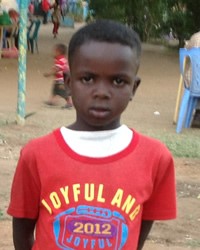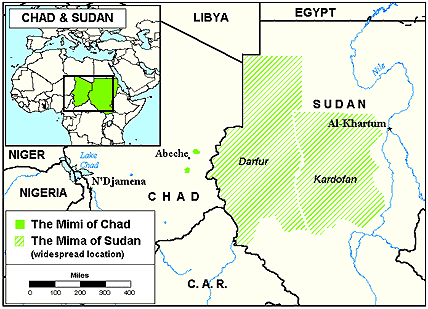The Amdang or Mimi people of Chad first lived in the Nile Valley of Egypt with a westward migration taking place in the fifteenth and sixteenth centuries. Some settled in the Biltine region of Chad where they became farmers. Others became nomadic herdsmen and maintained frequent contact with the Arab nomads. The settled Biltine group, or Mimi, still speak their ancestral language, Amdang.
The nomadic Mimi eventually adopted the Arabic language although many also speak their traditional Amdang language. Thousands of people have fled western Sudan and now live as refugees in the region where the Mimi live.
The Mimi Amdang in Chad are mostly farmers who inhabit the hilly eastern part of Dar ("home of") Mimi. There, they raise grains, beans, sesame and a variety of other crops; they also keep some livestock. A few Mimi are nomadic herdsmen. They live like the pastoral Arabs rather than farm for their livelihood. Mimi nomads live in mud homes made with thatched-roofs. Agan is the largest urban area for the Mimi. Dar Mimi is sandy and virtually treeless. Because of the shortage of water in the area, the settled Mimi are limited in the number of animals they can keep. Both the farmers and herdsmen of the Amdang are dependent on the rainfall. In draught years, both groups can face starvation.
Ethnic Muslim groups, including the Mahamid Arabs, the Zaghawa, the Mararit, the Tama, and various Maba-speaking tribes surround the area where the Mimi dwell. The settled Mimi sometimes intermarry with the Maba and the Arabs; whereas the nomadic Mimi intermarry with the Zaghawa and the Abu Sharib peoples. Because of this intermarriage among the Mimi and the neighboring groups and cultivation techniques other people groups have been assimilated into Mimi culture.
A man may have up to four wives if he can afford them. Most men have one wife. Social and political lives of Mimi people have been disrupted due to civil wars that are taking place in Chad. Mimi of Sudan are chiefly nomadic herdsmen. Most of them own herds of camels and flocks of sheep and goats. During the winter months, the young men take some of the camels to grazing areas that have an abundance of water and grass. Some of the men also go to market towns to sell animals or to buy grain, cloth, sugar, and tea. The women weave rugs, while the men make water-skins, buckets and ropes. Children have responsibilities such as spinning goat and camel hair into thread. Mimi live in twenty or thirty villages headed by chiefs. Mimi men fight well in battle and are commended for their bravery.
Mimi people are entirely Muslim, as are many other groups in the Sudanic region of Africa. This is due to the influence of Arab merchants. Islam is a religion of works based on five basic teachings or "pillars." Muslims must affirm that "there is no God but Allah, and Mohammed is his prophet." They are also required to pray five times a day, give alms to the poor, fast during the month of Ramadan, and try to make at least one pilgrimage to Mecca. The Mimi are not as strict in their observance of Islam as are some other Muslim groups in the area; however, they follow most of the rules. The Mimi's form of Islam is influenced by folk religion and animism.
Amdang people have never heard the biblical gospel of Jesus Christ. There currently are no Christian resources available to those who speak Amdang. The Scriptures need to be made available in their language. Christian broadcasts in Ampang need to be aired in their regions so that they will hear the message of salvation. Mimi groups like the Amdang need more educational opportunities and modern health care facilities. Perhaps Christian teachers and medical workers will have the greatest opportunities to share the love of Jesus with them.
Pray that the Holy Spirit will prepare Mimi Amdang people in Chad for when they hear the gospel. Ask for intercessors and anointed witnesses for Mimi Amdang people in Chad. Pray that Bible resources will be available in the Amdang language very soon. Pray that the Lord will send believers who understand both their language and the spiritual mindset of these people. Pray that leaders, husbands and fathers will be saved and lead their families to Lord Jesus, and that strong churches will be planted and reproduced quickly and soon.
Scripture Prayers for the Mimi, Amdang in Chad.
https://www.101lasttribes.com/tribes/mimi.html
| Profile Source: Joshua Project |











